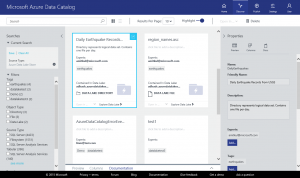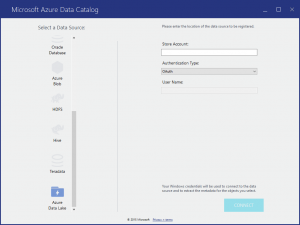Organize and discover your big data in the Azure Data Lake with Azure Data Catalog
Enterprise data is growing at a remarkable pace today. A large portion of the growth in data is coming from a wide variety of unstructured and semi structured sources such as sensors, social, click streams and machine generated logs. Businesses of all sizes face the challenge of storing, organizing and utilizing their data in an efficient manner. In October, we announced the Azure Data Lake making it easy for enterprises to store analytics data at any scale and to gain valuable insights from their data assets. Today we are excited to announce the ability to register, enrich, discover, understand and consume big data in the Azure Data Lake by using the Azure Data Catalog.
The Azure Data Lake Store provides an enterprise-wide repository to store data of all sizes, formats and speeds that have both present and future value. These large datasets can then be used for the purpose of operational and exploratory analytics. Using the Azure Data Catalog any analyst, data scientist or data developer in the enterprise can register their big data sources in their enterprise data catalog. The information in the data catalog can then be further enriched by others in the organization. This enables a variety of users to be able to search and discover these data assets and learn more about them. Once data is discovered, users can then leverage all the services in the Cortana Analytics Suite such as Azure Data Lake Analytics, Azure HDInsight and any other applications that are integrated with the Azure Data Lake Store.
The video below gives you a quick overview of the key capabilities:
For more information about how to use the Azure Data Catalog with Azure Data Lake visit:
Comments
- Anonymous
January 18, 2016
Are there plans to include featues like preview of data and reading columns from file headers in later versions?- Anonymous
January 20, 2016
Hi Helge,There are several features that are planned in this area. Your feedback is noted and is under consideration by to the engineering team. Please also feel free to enter it on the Azure Data Catalog forum here: https://social.msdn.microsoft.com/forums/azure/en-US/home?forum=azuredatacatalogThanks!
- Anonymous
- Anonymous
April 22, 2016
Is there any plan to provide feature to create and manage taxonomies?

